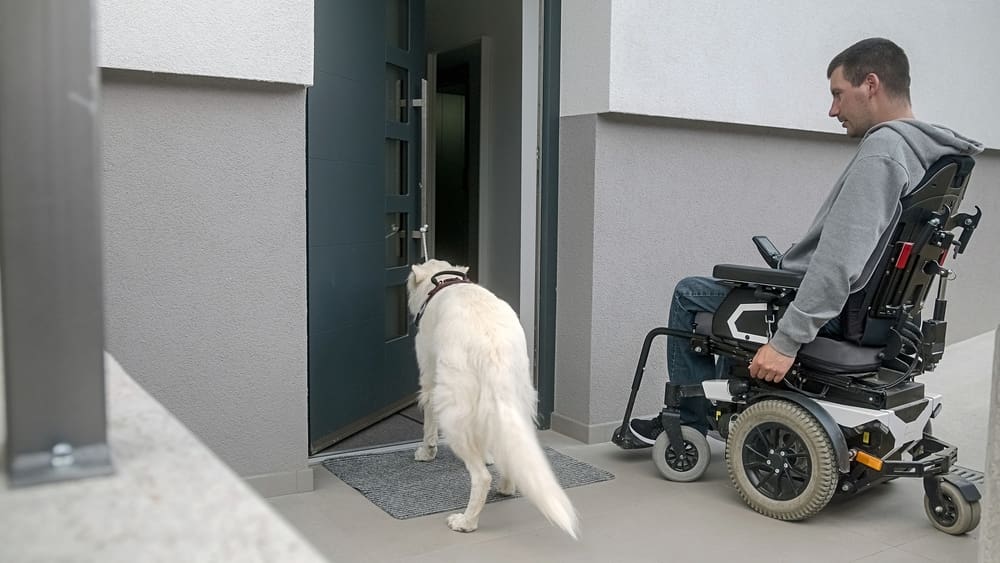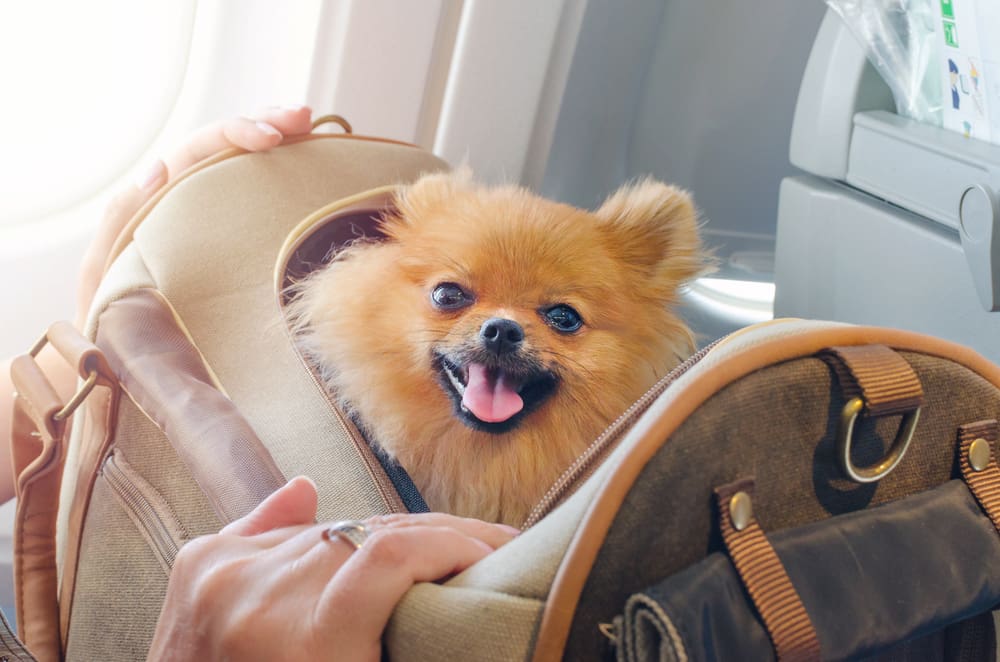Emotional support animals are assistance animals that help their handlers with psychiatric disability live better lives by providing therapeutic companionship. By law, these animals aren’t considered pets – emotional support animals are assistance animals with certain protections.
Washington State has published various guides to inform residents about the rights of emotional support animals. As these assistance animals are an irreplaceable asset for their owners, Washington exempts ESAs from certain restrictions.
Our article will discuss all you need to know about Washington ESA laws, including for housing, air travel, and public transportation. Read to the end to learn everything about ESA laws in The Evergreen State.
What Is An Emotional Support Animal?
Emotional support animals are assistance animals that provide comfort to their handler with a psychiatric disability through companionship. These assistance animals aren’t trained for a specific purpose, but the therapeutic benefits of these animals have long been accepted as an effective treatment method.
As they are a part of the treatment process, only licensed mental health professionals (LMHPs) can decide if an individual needs an emotional support animal.
After obtaining an emotional support animal letter from an LMHP, the individual’s pet will become an emotional support animal and get protection in Washington. You’ll find the legal protections of ESAs in Washington in the later parts of our article.
Difference Between ESAs and Service Animals in Washington
While the above is a general overview of emotional support animals, one important note is they are different from service animals. Knowing their differences will help get a better understanding of Washington ESA laws.
Here are the key differences between ESAs and service animals before diving into specific laws that grant these assistance animals protections.
Type of the Animal
Emotional support animals can be any pet you can legally have in Washington. This includes, but is not limited to, dogs, cats, birds, ferrets, hamsters, Guinea pigs, and rabbits.
While any trained animal can assist an individual with a disability, only dogs are recognized as service animals by the Americans with Disabilities Act. Even if an animal, whether a monkey or a miniature pig, is trained to help their handler, they can’t become service animals by law.
Therefore, you can have any animal you can legally keep as an emotional support animal, but you can’t have them as your service animal – only dogs and occasionally miniature horses are recognized as service animals.
Purpose and Training
Emotional support animals don’t require any training to become ESAs. They exist and comfort their owners through companionship. Service animals, on the other hand, are specifically trained to help an individual with a disability.
Take psychiatric service animals as an example. These dogs can be trained for various tasks, such as providing deep pressure therapy to comfort someone going through an anxiety attack or guide their handler when disoriented.
The difference in how they assist their handler draws a clear line between emotional support animals and service animals. For many, this explains the differences when it comes to the legal protections of these assistance animals.
Eligibility and Legal Protections


Emotional support animals need an ESA letter written by a licensed mental health professional. It works like any other prescription where the LMHP advises the individual to have an ESA to alleviate their symptoms. Without this document, ESAs are treated as any other pet and aren’t given additional legal protections in Washington state.
Service animals don’t need any legal documentation like emotional support animals do. They only require proper training, where they can help their handler in their daily life to qualify as a service animal.
Service animals are granted public access rights as their handlers rely on them to perform tasks for their disability. Therefore, they are treated more or less as a medical device. Just as someone requiring the use of a wheelchair needs it to get around, individuals with a disability have the legal right to keep their service animals when visiting public spaces.
The same movement freedom isn’t given to emotional support animals as the Americans with Disabilities Act doesn’t recognize them. Nonetheless, emotional support animals have other protections shared with service animals.
A Quick Overview of Washington Emotional Support Animal Laws
Washington State has specific definitions for emotional support animals, but like other states, there are no state laws governing ESAs. However, federal law protects emotional support animals under certain circumstances, particularly for housing. Below, you’ll discover the details of ESA laws effective in Washington.
Washington Emotional Support Animal Housing Laws
Although there aren’t specific ESA laws in Washington, the Fair Housing Act requires housing providers to permit ESAs as reasonable accommodations to live with their owners.
The Fair Housing Act prevents housing providers from discriminating against prospective tenants due to their disability. Since individuals with a psychiatric disability need their emotional support animals as part of their treatment, reasonable accommodations must be made by landlords to allow the individual to live with their ESA.
These protections are granted even when there’s a city-wide restriction on certain breeds. For example, Auburn restricts pit bulls and kuvasz. If your ESA is any of these dog breeds, you won’t be forced out of the city to look for a new home. You can legally live with your pit bull or kuvasz emotional support dog in a rental.
Here’s more to the place emotional support animals have in housing laws.
ESAs in a No-Pet Residential Property
Housing providers in Washington State can’t deny housing to an individual just because they have an emotional support animal. Even if the landlord has a no-pet policy, denying housing because they have an ESA for their disability is a clear Fair Housing Act violation.
The law is also in place when you want to bring home your ESA, but there’s a no-pet clause in the lease or rental agreement. With a valid ESA letter, you can request reasonable accommodation for your emotional support animal due to your disability.
That said, you must inform your landlord and request reasonable accommodation for your ESA to live with them in a no-pet residential property in Washington.
ESAs in No-Pet Residential Buildings
In some cases, the housing provider must put a no-pet clause in the lease due to building-wide decisions restricting animals. This can be a complete ban on pets entering the premises, restriction of certain breeds, or placing a weight limit.
Again, by definition and law, emotional support animals aren’t pets. They are assistance animals the handler requires for their disability. Regardless of the pet restrictions set by the building management, reasonable accommodations must be made for emotional support animals.
Pet Fees, Deposits, and Other Charges
Another protection for ESAs under the Fair Housing Act is a landlord cannot charge a pet deposit or fee for an emotional support animal. The landlord also can’t increase the rent because of an ESA.
However, the landlord can legally require the tenant to pay for any damages caused to the property other than normal wear and tear by the emotional support animal.
ESAs in University Housing
Washington has some of the best universities in the country. While this makes the state attractive for students, what about living with your ESA in a university housing in Washington?
Universities aren’t required to permit emotional support animals in dorm rooms inside campus buildings. It’s ultimately up to the university to decide if they allow ESAs. Contact your school to know the ESA policy for ESAs in dormitories. Luckily, many universities and colleges accept emotional support animals in dorm rooms.
Can Landlords Legally Reject an ESA in Washington?
Landlords in Washington can legally reject emotional support animals under certain circumstances. For a landlord to legally deny housing to someone with an ESA, the space for the animal must be limited.
For example, a landlord may legally deny housing to an individual wanting to rent a studio apartment with a miniature horse or Great Dane as their emotional support animal.
Another legal reason for a landlord to reject an ESA in Washington is if the animal’s presence is causing health concerns. For example, if the ESA aggravates the allergies of someone already living in the house, they may legally deny housing.
Along with the above, the ESA causing harm to others or the property is another legal reason for a landlord to deny housing. While these are all acceptable arguments, it’s often a rare occurrence or too extreme for most ESA owners.
Washington Laws for Air Travel With an Emotional Support Animal


The Air Carrier Access Act (ACAA) and the Americans with Disabilities Act allow service animals to fly in the passenger cabin with their handlers free of charge. In the past, emotional support animals were also permitted, but with the changes in late 2020, only service animals can fly with their owners in the passenger cabin.
This change means emotional support animals are treated as pets for air travel. Therefore, you must comply with the airline’s pet policy to fly with an emotional support animal from or to Washington.
How to Fly With an ESA?
Emotional support animal owners have two options for flying. If your ESA is small enough to be transported in an airline-approved carrier, they can fly in the passenger cabin. Generally, airlines only accept small dogs and house cats as a carry-on. Those with a small ESA other than a dog or cat may need to search for alternatives.
If your ESA is too large to fly in the cabin, they can fly in the cargo compartment as a checked animal. This is the only option for those with an ESA too large or not allowed to fly in the passenger cabin due to type or breed.
However, like in the passenger cabin, the animals the airlines accept in the cargo compartment may vary. Before booking your ticket, check the airline’s pet policy to ensure your ESA can fly with you.
Also, airlines don’t charge pet travel fees for service animals but do for emotional support animals. You’ll need to pay whether your ESA flies with you as a carry-on or in the cargo compartment.
Pet-Friendly Airlines That Fly to/from Washington
Below is a list of airlines with regular flights to and from Washington State that accept pets. The airline requirements for carrier, weight, and pet travel fees may vary. Check the pet policy of the airline you’re flying to ensure you can fly with your ESA.
- American Airlines
- Alaska Airlines
- Delta Air Lines
- United Airlines
- Spirit Airlines
ESAs and Public Transportation in Washington
Washington State has an impressive public transportation network with buses, trains, and ferries. These make getting around the state easy, especially with the ORCA card you can use for every public transport vehicle.
However, using public transport in Washington with an emotional support animal isn’t as straightforward. Unlike service animals, which are granted public access, your emotional support animal must be in a carrier to use public transport in Washington. This rule applies to all public transportation vehicles.
How to Get an ESA Letter in Washington?
Getting an ESA letter in The Evergreen State doesn’t need anything additional than other states. Here’s a quick overview of how to get an ESA letter in Washington.
Speak With Your LMHP
Only a licensed mental health professional can write you an ESA letter, so you must schedule an appointment with one and attend evaluation sessions for them to write one.
If you have a pet and feel comforted by their presence, you can mention this to your doctor to give them a good reason to write you an ESA letter. However, there’s always a chance that your LMHP may not find it suitable for you to have an emotional support animal.
Your psychiatric condition, mental health history, lifestyle, and everything else that goes into your life and psychiatric disability will be a factor for them to consider. That said, there’s no guarantee you’ll get an ESA letter simply because you’re requesting them to write it.
Obtain Your ESA Letter
Assuming your mental health worker decides you will benefit from having an emotional support animal, they will write you an ESA letter. During this process, they may ask additional questions about your emotional support animal to complete the paperwork, such as their breed.
After obtaining your ESA letter, you can use it to request reasonable accommodation from your housing provider.
FAQs About ESA Laws in Washington
Can I Use Washington-Issued ESA Letter in Other States?
No, your ESA letter must be written by a LMHP in your state of residence. If you are moving and aren’t connected with a LMHP in Washington (or your new state), consider reaching out to us for a consultation – we can connect you with a LMHP in your area.
What Do I Do if I’m Denied Housing Because of My ESA in Washington?
If you believe that you’ve been denied housing because of your emotional support animal, file a complaint with the Department of Housing and Urban Development. You can also reach the government agency by dialing 1-800-669-9777. Alternatively, consider taking your complaint to the Washington State Human Rights Commission.
Can Landlords Reject an ESA Letter in Washington?
Landlords in Washington can only reject your ESA letter if it’s invalid or illegitimate. The most common reason for an invalid ESA letter is that it’s been too long since the LMHP wrote it. ESA letters technically don’t expire but are typically only valid for one year. Your landlord may also reject your ESA if they are too big for the property or cause destruction or harm.
Wrapping Up Washington ESA Laws


The ESA laws in Washington State are straightforward since the state doesn’t have a legal provision that governs emotional support animals.
In Washington, individuals with a psychiatric disability can request reasonable accommodation for their emotional support animals, even if it’s a no-pet rental. This also extends to buildings with no-pet restrictions and other limitations, such as breed bans.
Since the ADA doesn’t recognize emotional support animals, they aren’t granted public access. When out and about with an ESA, Washington residents must comply with the pet policies of businesses to enter the premises.
While this wraps up Washington ESA laws, the last point also makes emotional support animals subject to the pet travel rules of airlines when flying. To fly with an emotional support animal from or to Washington, the ESA owner must comply with the airline’s pet policies and pay a fee.




